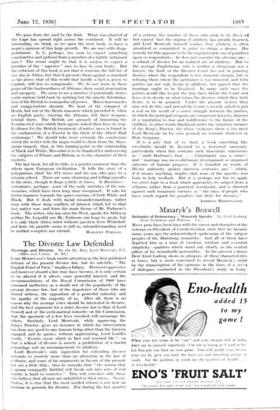The Divorce Law Defended
Marriage and Divorce. By the Rt. Hon. Lord Merrivale, F.C.
(Allen and Unwin. • 2s. 6d.)-- • " " LORD MERRIVALE'S book merits attention as the first published defence of the present divorce law, but its sub-title, " The English Point of View," implies a fallacy. However oppressive and hoWever absurd a law may have become, it is only certain to be altered if it affects some- powerful interest, and the recommendations of the Royal Commission of 1909 have remained ineffective as a result not of the popularity of the present divorce law, but of the impotence of those who are denied redress, the opposition of a powerful minority and the apathy of the majority of us. After all, there is no reason why the average voter should be interested in divorce, and the best argument for a strict divorce law is that of Lord Stowell and of the ecclesiastical minority on the Commission, that the spectacle of a few lives wrecked will encourage the others. Similarly, Lord Merrivale, while approving the King's Proctor, gives no instance in which his intervention has done any good to any human being other than the lawyers engaged, and he quotes, without appreciating, Lord Gorell's words; " Events occur which in fact end married life "--so that a refusal of divorce is merely a prohibition of a lawful remarriage and an encouragement to adultery.
Lord. Merrivale's only suggestion for extending divorce amounts to scarcely more than an alteration in the law of evidence, and some of his arguments in favour of the present law are a littk thin : thus he remarks that " the notion that a spciuse conjugally faithful will break out into acts of real cruelty is hard to conceive." This will convince only those who believe that all men are unfaithful to their wives. Never- theless, it is true that the most needed reform is not now an increase in grounds for divorce. For during the last quarter of a century the number of those who wish to be divor.ed but cannot face the stigma of adultery has greatly lessened. and Lord Merrivale himself realises that adultery is often simulated or committed in order to obtain a decree. His remedy for this appears to be the impracticable one of penalties upon co-respondents : he does nut consider the obvious one— a refusal of divorce for an isolated act of adultery. But to the average Englishman, who is neither a elergyman nor a lawyer, the fault of the Divorce Court lies nut in granting decrees where the respondent is not immoral enough, but in refusing them where the petitioner is too immoral, and both parties are not only living in adultery, but agreed that the marriage ought to be dissolved. In many such eases the parties would like to put the true facts before the Court and leave it to decide on what terms the divorce, which they both desire, is to be granted. Under the present system they may not do this, and instead the Court is merely asked to put a seal on the result of a secret struggle between the parties, in which the principal weapons are competent lawyers, absence of a reputation to lose and indifference to the future of the children, in other words blackmail under the statutory menace of the King's Proctor, for whose existence there is Ito meet Lord Merrivale on his own ground) no warrant whatever in
Holy Scripture. . .
It is a pity that of so short a book something like two-thirds should be devoted to a historical summary, particularly when this contains such inaccurate statements as " until Hadrian's time . . . Christianity was a crime", and marriage was no evolutionary development or organised outcome of human progress. It is founded DO Words of Divine authority spoken nineteen centuries ago "—which, if it means anything, implies that none of the apostles was born in holy wedlock. But it is perhaps not fair to apply too strict logic to a book which approaches its subject from a religious rather than a practical standpoint, and is directed against such imaginary enemies as " the class of people who have much regard for penalties but little for decency."
AMHROSE HOOPINGTON.






















































 Previous page
Previous page